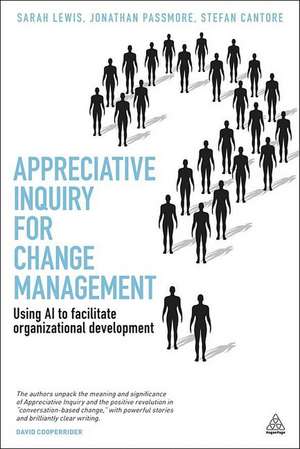Appreciative Inquiry for Change Management
Autor Sarah Lewis, Jonathan Passmore, Stefan Cantoreen Limba Engleză Paperback – 27 aug 2011
Preț: 299.24 lei
Nou
Puncte Express: 449
Preț estimativ în valută:
57.28€ • 62.24$ • 48.14£
57.28€ • 62.24$ • 48.14£
Carte tipărită la comandă
Livrare economică 16-22 aprilie
Preluare comenzi: 021 569.72.76
Specificații
ISBN-13: 9780749463557
ISBN-10: 0749463554
Pagini: 214
Dimensiuni: 158 x 234 x 17 mm
Greutate: 0.37 kg
Editura: Kogan Page
ISBN-10: 0749463554
Pagini: 214
Dimensiuni: 158 x 234 x 17 mm
Greutate: 0.37 kg
Editura: Kogan Page
Cuprins
Chapter - 00: Introduction; Section - ONE: Understanding conversational approaches to change; Chapter - 01: Organizations as machines, workers as cogs and management as a control process; Chapter - 02: An alternative approach: organizations as living human systems; Chapter - 03: The development of conversational approaches to organizational change; Chapter - 04: Appreciative Inquiry: how do you do it?; Section - TWO: Advanced ideas and practice; Chapter - 05: The power of the question; Chapter - 06: The power of conversation; Chapter - 07: Extending practice: working with story in organizations; Chapter - 08: Developing your conversational practice; Chapter - 09: Becoming an appreciative conversational practitioner; Section - THREE: Using conversational approaches in the organization; Chapter - 10: How to introduce Appreciative Inquiry and related approaches to your organization; Chapter - 11: Case study: Using Appreciative Inquiry at BP Castrol Marine - David Gilmour and Anne Radford; Chapter - 12: Case study: Revitalizing corporate values in Nokia - Caryn Vanstone and Bruno Dalbiez; Chapter - 13: Case study: World Café - Arian Ward, Paul E Borawski and Juanita Brown; Chapter - 14: Case study: Applying Appreciative Inquiry to deliver strategic change: Orbseal Technology Center - Jacqueline M Stavros and Joe R Sprangel Jr
Recenzii
"This book explains how AI works and how to use it to deal with common organizational challenges. The first part of the book contrasts the view of organizations as machines with the alternative perspective of organizations as living systems capable of using imagination and positive emotional energy to produce change....The book includes an annotated list of websites for discussion groups, online spaces, and consultancies." - Book News, Inc.
Notă biografică
Sarah Lewis is an occupational psychologist and a founding member of the Association of Business Psychologists.
Jonathan Passmore is an occupational psychologist and the author of Excellence in Coaching, published by Kogan Page in association with the Association for Coaching.
Stefan Cantore is a consultant in the areas of leadership and management development
Jonathan Passmore is an occupational psychologist and the author of Excellence in Coaching, published by Kogan Page in association with the Association for Coaching.
Stefan Cantore is a consultant in the areas of leadership and management development
Descriere
Appreciative Inquiry (AI) is one of the most exciting and increasingly recognized concepts to facilitate organizational change. This book studies AI in depth, illustrating the method of asking particular questions and encouraging staff to consider both the positive and negative systems in place and to recognize the need to implement change.
